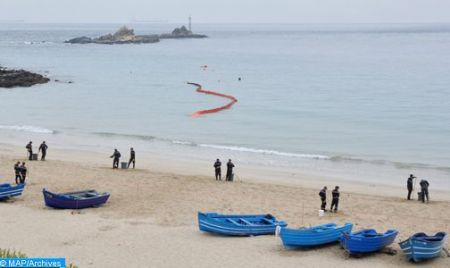Migration Governance: Morocco’s Holistic Approach to Address Increasingly Complex Phenomenon
To cope with increasingly complex migratory pressures, Morocco is deploying tremendous efforts as part of a holistic approach covering all dimensions of this phenomenon, within which concern for human dignity enjoys a major place. Faced with massive flows of illegal migrants from Africa and other continents, Morocco has become over the past decade not only a country of transit to Europe, but also a land of residence and asylum for many immigrants and refugees fleeing the horrors of armed conflict and the climate hazards. -A humanist, inclusive and supportive approach Convinced that migration cannot be managed solely through a security-based approach, Morocco is resolutely committed to building migration governance that is humanistic, inclusive, supportive and respectful of the Kingdom’s international human rights commitments. At a time when recent events have presented us with sad images of the migrants’ human dignity and political, media and electoral posturing, when migrants are seen as ideal scapegoats and when fortresses and barriers are being more and more erected, Morocco’s initiatives stand in stark contrast to the primitive rejection of migrants. Indeed, the Kingdom confirms its uniqueness at regional level, where its leadership is recognized and proven by unprecedented actions. These actions are real landmarks in global migration governance: the launch of the Rabat Process in 2006 (a true bridge for North-South cooperation), the Marrakech Global Compact (the main reference for international cooperation), the African Agenda for Migration and the African Migration Observatory, the High Royal Initiative, made concrete through audacious operations to regularize the status of over 50,000 migrants, and the establishment of a comprehensive reference system for the reception and care of migrants. Following the High Royal Initiative, the National Immigration and Asylum Strategy (SNIA), put in place to ensure better integration of immigrants and better management of migratory flows within the framework of a coherent, global, humanist and responsible policy, has led to recognition by Africa, which has designated HM King Mohammed VI as the leader on migration issue in Africa. The humanist dimension of migration management in Morocco is also reflected in the voluntary returns made available to migrants who wish to return to their countries of origin in full respect of their rights and dignity. Since 2018, more than 8,100 African nationals have benefited from these operations organized and financed by the Ministry of the Interior, both by air and by land. – Morocco, a responsible player in managing migratory flows At the same time, Morocco, as a responsible partner of the European Union, stands firm against attempts to use its territory as a base for illegal transit to Europe, but without the necessary support from its trans-Mediterranean partners. With the means at hand, more than 360,000 attempts of illegal migration have been aborted and some 1,300 networks dismantled since 2017. These operations are carried out with full respect for human dignity and the protection of vulnerable victims of the mafia and organized crime. This is borne out by the number of illegal immigrants rescued by Morocco’s Royal Navy, which reached almost 15,000 in 2021 alone. Morocco’s resolute approach to the paradigm of migrants’ rights debunks the arguments of some players or associations known for their dogmatic posturing, radical analysis and excess, that reject any common sense linked to the context and reality of certain tragic events, such as the June 24, 2022 assault on Nador. These events are the most dramatic illustration of the scale of the challenges posed by the management of the migratory flows, in the knowledge that they are carried out by trafficking networks using highly violent strategies, particularly during assaults planned “in a quasi-military manner, with assailants profiling militiamen and former soldiers from countries destabilized by war and conflict.” Between 2016 and 2022 alone, Morocco succeeded in stopping more than 145 such assaults around the occupied enclaves of Sebta and Melilia. -The humanist approach perverted by criminal networks and instrumentalization This shows that “the noble and virtuous migration dimension is perverted by the criminal actions of trafficking networks, which exploit the victims’ vulnerability and push them into dangerous and murderous adventures,” as Khalid Zerouali, Director of Migration and Border Surveillance at the Ministry of the Interior, points out. Human tragedies such as the one in Nador have been exploited, whereas the urgent issue is how to join actions of all the institutional players and civil society in order to improve national migration governance, which is still far from perfect. It is important to draw the appropriate lessons, to reframe and improve the niches of the shortcomings observed, and not to remain in the comfort of unproductive observations and systematic incrimination. On a regional and international level, Morocco is paying the price for the sometimes premeditated laxity of its eastern neighbors, and finds itself alone in having to cope with the worrying evolution of migratory flows combined with cross-border organized crime. The migration issue must be tackled within a framework of shared responsibility and partnership with Europe. Beyond that, it requires a more sustainable and mutually beneficial approach to migration that protects national borders and sovereignty, while reasonably opening the doors to the legal and sustainable movement of people between North and South countries.

